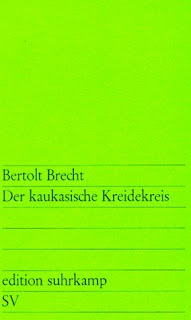Brecht, Bertolt "The Caucasian Chalk Circle" (German: Der kaukasische Kreidekreis) - 1944/45
The story describes the parable of the true mother who is recognized by the love for her child. The story was already described in the Bible, it gave us the expression "Solomon's Judgment", then it was also told in China in the 13th century as "The Chalk Circle".
Brecht transposed the story to the time after World War II. It makes sense anytime. Some people only think about themselves and money. The story stands for everything that is wrong in society.
Book description:
"The city burns in the heat of civil war and a servant girl sacrifices everything to protect an abandoned child. But when peace is finally restored, the boy's mother comes to claim him. Calling upon the ancient tradition of the Chalk Circle, a comical judge sets about resolving the dispute. …
Few authors have had such a dramatic effect as Bertolt Brecht. His work has helped to shape a generation of writers, theatergoers, and thinkers. His plays are studied worldwide as texts that changed the face of theater. The Caucasian Chalk Circle is a parable inspired by the Chinese play Chalk Circle. Written at the close of World War II, the story is set in the Caucasus Mountains of Georgia. It retells the tale of King Solomon and a child claimed by and fought over by two mothers. But this chalk circle is metaphorically drawn around a society misdirected in its priorities. Brecht's statements about class are cloaked in the innocence of a fable that whispers insistently to the audience.
No translations of Brecht's work are as reliable and compelling as Eric Bentley's. These versions are widely viewed as the standard renderings of Brecht's work, ensuring that future generations of readers will come in close contact with the work of a playwright who introduced a new way of thinking about the theater."


It sounds very interesting. I realise it is a play, and I am not so fond of reading plays. Prefer to see them on stage. However, because the topic is so interesting I might go outside my comfort zone.
ReplyDeleteIt is only 144 pages so might add it for the German Lit month and Novellas in November.
ReplyDeleteThanks for that, Lisbeth. It is very interesting. Same as you, I prefer to watch a play rather than read it, after all, that's what it was written for. However, sometimes that's not possible. Most of my Shakespearean experience comes from reading the plays.
ReplyDeleteAnd yes, it would be a good novella as well as a German book. Two birds with one stone (or two flies with one flap, as we say in German).
Happy reading.
Oh my gosh Marianne! I remember doing this one in my final year in drama school. It had such a profound influence on me....
ReplyDeleteSo lovely to see it featured on someone's blog. Yea!!
Lovely thoughts Marianne.
Elza Reads
Oh, I'm glad you liked this, Mareli. I don't always know whether it's such a good idea to write about books I read a long time ago or that are not on the radar of most international readers but your comment proves that it is worth it. Glad it had such an impact on you. As it had for me.
Delete